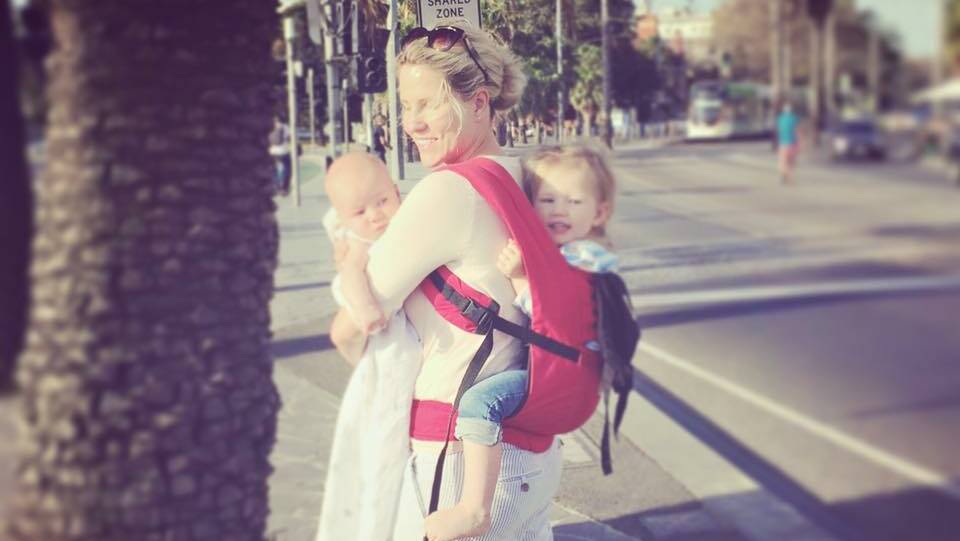
I used to be extremely hypersensitive to caffeine, so much so that I wrote about it extensively in my first book.
Subscribe now for unlimited access.
$0/
(min cost $0)
or signup to continue reading
“If I even look at a piece of chocolate, a can of Coke, or touch a coffee bean, the caffeine instantly implants itself into the base of my spine and attacks my body like a bacterial infection spreading through a hooker in Peru. Then I magically transform into the girl at the Junior League luncheon, sucking on her strand of pearls in the corner of the room, and rocking back and forth while talking to herself.” – Summerlandish
But then something happened. (Well, two things…) I gave birth to my children, Daisy and Axel, and decided to try coffee to help me “mom” better.

Initially worried about a psychotic episode that might result in me vigorously hogging all of my kids’ colouring books and Play-Doh, I sipped my half-strength flat white slowly. My eyes popped open and my boisterous (screaming) kids suddenly seemed sweet and adorable again.
After a few weeks, I felt so great that a full-strength coffee sounded like the best idea ever! Now, a year later I’m your double shot latte girl who café hops around Mudgee all day with two kids in tow and a smile on my face, and get this: I’m relatively normal in public, sleep well at night and haven’t erratically offered to be someone’s surrogate.

So why is my body suddenly okay with caffeine? By ‘okay’ I mean completely dependent, but totally functional. Is it because parenthood has made me so sleep deprived that caffeine just bumps me back to how I used to feel pre-kids? Or is it because I started drinking it every day and not just sporadically? I decided to ask my friend and science writer, Clare Watson, to explain caffeine to me.
Clare: I work in a research lab where we keep powdered caffeine in the toxins cabinet – and rightly so. Caffeine is a powerful drug and yet it is the most widely consumed over-the-counter stimulant the world over.
One cup of coffee has about 100 milligrams of caffeine, depending on the strength of the brew. With the explosion of cafés and bearded baristas, a moderate daily intake of caffeine is nowadays in the ballpark of 400-500 milligrams. But like you’ve experienced, some people can be more sensitive than others.
Some effects of caffeine are beneficial, such as enhancing your attention and improving your alertness, particularly at times when you are usually in a lull. Fuelled by caffeine, which stimulates a rush of adrenaline, we can achieve great things, like the time you drank a Red Bull and wrote about, “…transcribing a five-pound astronomy textbook, word-for-word, into a notebook; cleaning my entire apartment with a bottle of bleach; and rearranging the clothes in my closet in rainbow order.” - Summerlandish
There are some other well-known negative effects of caffeine: a dose can bring on the feeling of a rapid or pounding heartbeat; or have a stress-like effect and elevate cortisol levels. Some people report that their symptoms of caffeine mirror anxiety.
To really understand how caffeine works, you have to start with adenosine, which is a normal by-product of an active brain. The longer you are awake, the more adenosine that builds up in your brain and you begin to feel tired. Adenosine works to put the brakes on a few excitatory messenger molecules, keeping them in check and dialling down brain activity at day’s end. In this way, it thought to play a role in sleep-wake regulation.
Caffeine is a rival to adenosine. When caffeine steps in, it blocks the receptors normally occupied by adenosine and so, by erasing adenosine inhibition, caffeine has a stimulatory effect.
However, with enough daily coffees, caffeine begins to have less of an effect. A tolerance develops as your brain adjusts to the amount of caffeine that you are supplying, and you are relying on six shots before 3 pm.
Summer: Thanks, Clare. So basically, because I eased back into consuming caffeine, I built up a tolerance. Kind of like the tolerance I have to grocery store meltdowns, cleaning up the same mess 40 times a day and that fact that I’ve aged 10 years in the past four. It’s also clear that I have an addiction I should probably address. I will add it to my list of things to do, just after, “bathe regularly.”
You can read more from Clare Watson online at sbs.com.au and follow her on Twitter @clarewhatson. Clare also has a monthly column with Lateral Magazine that features unusual and unexpected ways that people can participate in science.
Get Summer Land’s memoir, Summerlandish: Do As I Say, Not As I Did, from summerlandauthor.com or at The Shop by Botobolar at 28 Church Street.

